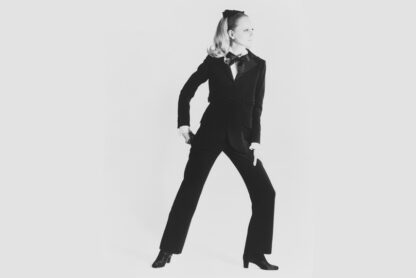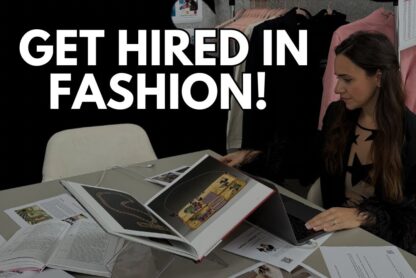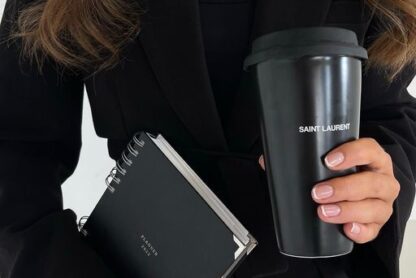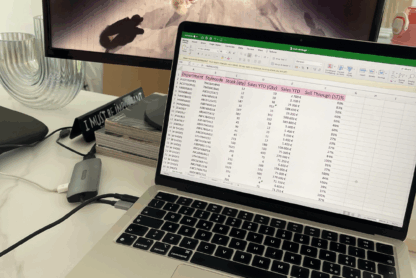In the competitive world of fashion, landing a job or internship at your dream company takes more than just a love for style—it takes some smart research! By digging into the details of a fashion company, you can show them that you’re genuinely interested and truly understand what they’re all about.
The key to breaking into the fashion industry is personalizing your application and demonstrating a deep understanding of the company. This effort will not only make your job application stand out but also set you up for success in interviews. I remember doing extensive research about Alexander McQueen before applying and even more before my job interview to land an internship in their e-commerce department. That preparation made all the difference.
This article will walk you through the process of researching fashion companies to boost your job or internship applications. From learning about their values and history to getting a feel for their culture and teams, we’ve got you covered.
Let’s dive in and get you ready to impress your future employers with your in-depth knowledge and enthusiasm!
How To Research Fashion Companies
Why is it important to research fashion brands?
To identify your dream fashion company
Some aspiring fashion professionals have a specific company in mind they want to work at: Gucci, Bottega Veneta, Chanel. But it’s not the same for everybody. Some only know what role they prefer. However, they don’t have a preference for the company, or they are unaware of all the different companies that exist.
And yet, identifying your dream fashion company is just as important as understanding which career in fashion is made for you. When you start looking for fashion jobs and internships, you need to take into consideration not only the tasks and skills required for the position but also the type of company it is.
It may sound obvious, but at your job/internship, you are not only exercising your functions as a buyer, product developer, marketing, or PR professional…; you are part of a bigger mission, a community, and a unique work environment. This will be your working space for the next 3-6 months if it’s an internship. It can also be more if it’s a full-time entry-level job. Therefore, it’s important to choose a company that will fit you, and where you will adapt as well.
Of course, it’s only once you set your foot at the office that you will fully understand whether you suit each other or not. However, there are already a lot of things you can learn about a company online (we will talk about it in a few paragraphs.) That’s why it’s important to do your research.
To prepare your job application
Another reason why you need to research the brand is to prepare your application when you apply for a fashion job or internship.
Remember that you need to tailor your applications to each company and position. This means that your resume and cover letter must include information that demonstrates you are not only well-informed about the specific position but also the company.
While it’s true that your CV will feature more of the keywords from the job description, your cover letter is where you are supposed to showcase your passion for a specific brand you are applying to, even if it’s brief. For example, you can say something like:
“As I am at the beginning of my career as an aspiring [the role you applied for] I see myself working in a place that values [include company values here] and focuses on [include here any relevant information about different aspects the company cares about] and according to the research I conducted about your company, (on the website, in a book, etc.) I found out that this is the best place for me to fulfill my passion for the fashion industry.”
This shows you 1) you did your research about the company and 2) you are not applying everywhere randomly just to get a job.
To prepare for the job interview
If you have been to at least one job interview in your life, I bet one of the questions the recruiter asked you was “Why do you want to work with us?”.
Recruiters want to hear how you ended up here aka why you are applying for this position and this company specifically.
This question can sound surprising to some people because unfortunately, the truth is, they don’t even know clearly why they want to work at that company. See, you can work as a designer, brand manager, or event producer at many brands… but why did you choose this company specifically?
The hiring manager should be able to see a direct link between your interest in fashion, the career you want to build in the industry, and the company where you want to exercise this role, so think about it.
What to research about a fashion company
Now that you know why you need to research the company where you wish to work or intern, you still might be confused about what exactly to research. So here is your to-do list:
What does the company do?
- If it’s a brand, what products does it offer? Does it provide a full wardrobe or does it design only shoes or nightwear?
- Is it a luxury brand, fast fashion, or premium segment?
- Who is the end consumer?
- Does the company specialize in other segments besides fashion?
- If it’s a magazine, what does it write about? What’s the target audience? The tone of the publication?
In addition, you should find out which departments there are inside the fashion company and where you see yourself.
The History
Reading the history of a brand or magazine is the best way to understand about it. You should know about the founder, the other creative directors who succeeded them, iconic pieces and runways, and other notable moments in fashion history. Most companies have a dedicated page on their website about the company’s history, so you should include this part in your research.

Mission & Values
So many people want to work at Chanel and Dior, but do you really know the company besides their iconic pieces and fashion shows aka its bigger mission and why it does what it does?
Every brand is different and was originally founded with a specific mission.
For example, this is the mission statement of Ralph Lauren: “For more than 50 years, Ralph Lauren has sought to inspire the dream of a better life through authenticity and timeless style.”
This is Zara’s mission statement:“By bringing more thoughtful style to the world, we aim to provide everyone, no matter where they are, with the inspiringly beautiful, always on-trend, responsibly crafted fashion they deserve.”
See, the missions are completely different. So if you work as a product developer, for example, at Zara you will design trendy pieces, while at Ralph Lauren you will focus more on timeless designs.
Company Values
The values can also differ from company to company. For instance, these are the values of LVMH: “Be creative and innovative, deliver excellence, cultivate an entrepreneurial spirit, and be committed to positive impact.”
If we are talking about groups and brands in the same segment, say luxury, we will also find some differences. If we look at the two biggest luxury conglomerates, LVMH and Kering, their approach to luxury is different even though they share the same goals like excellence and innovation.
At LVMH: “Each of the Group’s 75 Maisons must cultivate the highest level of quality, not simply to maintain it year after year, but also to elevate it as we continually set even higher standards.”
At Kering: “Inspiring. Empowering. Audacious. Our vision of contemporary luxury is founded on creative risk-taking that influences and elevates the way we live to become more expressive, more beautiful and more sustainable. We entrust the creative direction of our Houses to uniquely talented individuals in the belief that imagination and creative thinking are our life-blood. We give all our employees every opportunity to grow and reach their full potential, trusting them to push boundaries and reshape the luxury world.”
The strategy and commitments
Brands are transparent about their strategies so you should read them as well because you will be part of the team working for the same goal once you are hired.
Fashion companies also outlay their commitments, for example in sustainability, and it’s also something worth looking at when you do your research about a brand.
Other Initiatives
Many fashion brands, especially luxury ones, no longer only make clothes but also tap into other niches like beauty and home decor to diversify their company and expand their influence. Researching these other initiatives is key to understanding the company as a whole.
The Talent
Brands know what talent they are looking for, and you can usually find this information at any fashion company. This can be useful for you to see if you match the candidate profile. As I already said, companies don’t only look for professionals who will merely execute the tasks, but people with a certain mindset, values, work ethic, and approach to work. This information can usually be found in the job description, but not always. So sometimes you will need to research that yourself.
Let’s see a few examples.
Saint Laurent: Are you fearless in the face of a challenge? Are you tenacious? Do you have the ambition and work ethic for a successful career in luxury? If so, we want you on our team.
Companies can also give you a hint about how they identify the ideal candidate when they review applications. For example, this is what CHANEL is looking for throughout the recruitment process, according to the Maison’s website.
“We recognise people in their full lives. You can best prepare by reflecting on:
What you do – the technical skills, capabilities and knowledge you bring to the role.
How you do it – how you achieve the things you do. How you approach your work, how you work with other people, how you show up day-to-day.
Motivation – your passions and purpose. We recognise that strengths are not just things that we are “good at”, they make us feel strong and energised.”
The reason why fashion companies are looking for specific profiles is because one cannot fit everywhere – at least not to the same extent. So candidates who match the talent profile the most have more chances of getting hired.
The career growth inside the company
When you look for a job or internship in fashion, it’s important to see beyond this specific position and be able to project yourself into your future in this company – even if you may change your mind later and decide to leave at any time.
This is why it’s crucial to research how you can grow inside the company. Very often, the brand/magazine has a dedicated page on its website about career growth opportunities and how the company supports professional development.
The benefits
When you work at a fashion company, you are often entitled to more or less benefits in addition to your compensation.
This is also an important aspect to look at when you research companies and what they offer you. Think work-life balance benefits, vacation, paid parental leave, shopping discounts, medical insurance, pension, etc.
Even as an intern, you cannot expect the same full benefits package as a permanent employee. However, since most internships are unpaid, companies can offer as a trade to reimburse some of your expenses, such as transportation and meals.
Where to research fashion brands
Official websites
Your research about the fashion company should start with visiting its official page. This is your direct and most trustworthy source of information.
Another way of researching fashion companies is to go directly to the websites of fashion groups: LVMH (that holds 14 fashion houses including Louis Vuitton, Fendi, and Christian Dior), Kering (Gucci, Saint Laurent, Bottega Veneta…), Prada Group (Prada, Miu Miu, Church’s), Inditex (Zara, Massimo Dutti, Stradivarius…), OTB (Diesel, Maison Margiela, Marni), Condé Nast (Vogue, Glamour, GQ), etc.
You will find all the information about those companies’ mission, history, talent, and open vacancies. The good thing about this type of platform is that all the information about the different brands/magazines is in one place. So you don’t have to search for it on each brand’s individual websites one by one.
Job descriptions
Already by reading the job description, you can understand the company in brief. It’s a great place to find out about the role, the skills required, and more information that you need to customize your resume and answer job interview questions.
LinkedIn is not only useful for finding fashion jobs and internships but also for researching the company.
In the search bar, type the name of a company, say Valentino, and you will find the following information:
- The “About” section with a brief overview of the company.
- Life: Other highlights of the company.
- Posts: All the latest news of the brand, which is a good tool to stay updated on what’s going on in the brand.
- People: You can find all the people working at the brand, which is super useful for networking and researching professionals at your chosen department to send them a cold email, asking for a job or internship opportunity. I explain more about the cold email strategy in my free webinar.
Other Social media
Instagram and TikTok are not just meant for entertainment but are also great platforms to keep up with the brand’s latest product launches, campaigns, and events. You can also reach out to professionals the same way as you can do through LinkedIn.
Informational interviews
Have you ever heard of informational interviews?
An informational interview is NOT a job interview but a meeting where you ask a fashion professional about their career path and their role in their current company (and connect with them, of course.)
Learning about a company directly from professionals who work there is one of the best ways to discover interesting things about it that you may not learn from a website or social media.
The informational strategy is a strategy I recommend using for all my students. Simply reach out to a professional who works in your desired company and position, and send a message to them on LinkedIn or Instagram saying you are impressed by their career and ask for a coffee chat or a virtual meeting to discuss more about their role.
I teach more about how to do informational interviews in my online course Break into the Fashion Industry. You can also register here for my free webinar.
I hope this article gave you insights into the importance of researching fashion companies and all the different things you can research about. Determining your favorite companies is important both for you to enjoy your workplace, and for your boss and colleagues who will work with you. So grab a pen and your notebook and start your research process 😉







